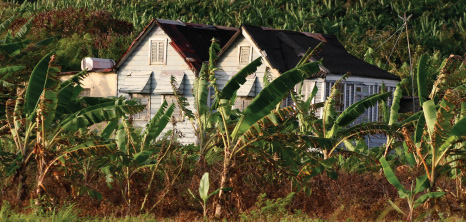|
African Heritage in BarbadosWhen one takes a good look around Barbados, there are many British influences that immediately come to the fore. The legal system, the educational system, the language and even the political system are all part of the heavy British influence that prevails over the country of Barbados. Historians have argued that this heavy influence has somewhat knocked back a lot of the strong African heritage that exists and goes so very readily unseen and untapped.
Buildings constructed by slaves back in the day in Barbados were an integral aspect of the architectural impact on the island. Though they were responsible for the construction of the the more British influenced buildings they were also very responsible for the construction of the very chattel houses in which they lived. These wooden houses were usually set on blocks as opposed to permanent foundations so as to aid in the easy movement from one plantation to another should the need arise. Chattel houses in Barbados are usually painted in vibrant colours which is another aspect of the African heritage that speaks out loudly on the island. Other lasting aspects of the African heritage that prevails in Barbados are notably recognised in the arts and culture, music and crafts on the island.
African slaves in Barbados aided in building the strong footing of the island's sugar plantations and as such sugar has played a dominant role in forging the unique culture of the island in more ways than one. The economic background of Barbados was built predominantly on sugarcane which was sown and harvested by African slaves. Approximately 70,000 slaves were freed in 1838 and were now in a position to give a greater contribution to developing a stronger African influence on Barbados.
Bussa and the Slave RevoltBussa was an African slave who led a historic revolt over the British rulers. His dedication and heroism spoke volumes when it came to the iniquity associated with slavery. As such, in 1985, the Emancipation Statue (commonly referred to by all Barbadians as "Bussa Statue") located at the St. Barnabas Roundabout, was unveiled to honor the 150th anniversary of emancipation and to symbolize the broken chains of slavery. In Barbados every year on the first Monday in August, a march takes place through the streets towards the Emancipation statue on the ABC Highway. It culminates with a ceremony that celebrates the abolition of slavery which is held on this spot with parades, speeches, educational displays and performances. His statue is viewed by millions annually.
Once slavery was abolished and Barbados gained independence from England in 1966, the island's population became predominantly descendants of the West African slaves that worked on the sugar plantations of former British land owners. Through the arts and culture, the influence of African slaves on the culture of Barbados is quite notable.
Crop Over FestivalCropover Festival is a three week festival that takes place in July and August to celebrate the traditional harvesting of the sugarcane crops. This festival includes weekly tent shows, fairs, parades, and various competitions. Crop Over Festival is a very popular and colourful festival which originated sometime back in 1780 when Barbados was easily considered the world's largest producer of sugar in the world. Once the crop season ended, a huge celebration took place to pay homage to the success of yet another "Crop Over".
Calypso music is an important part of the festival and yet another product of West African culture.
Tuk MusicIn the mid 1600s, African slaves brought tuk music to Barbados much to the despise of the English slave owners who implemented a law that stated death to be one of the penalties for anyone caught playing drums. This law was enforced as the plantation owners were fearful that the slaves would use these very drums as a means of communication amongst each other and possibly plan riots.
Drums to the slaves came as natural as breathing and so it was very difficult to separate the two. So much so that they found a way to be able to keep the rhythm of the drum in their hearts as they would play during the weekend and when away from the plantations and out of sight from their masters.
Other strong African influences that exist in Barbados today are evident in calypso music, soca, reggae, warri, sticklicking, cou-cou, conkies, the landship and the language of proverbs.
|
|
|


